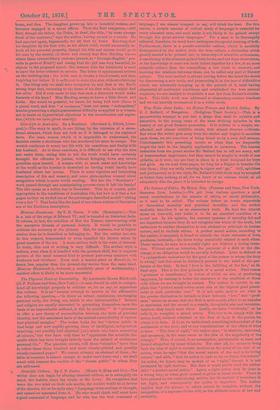The Science of Ethics. By Henry Day. (Putnam and Sons,
New York. Sampson Low, London.)—We get from various quarters a good many contributions to the science of ethics, or moral philosophy, as it used to be called. The volume before us treats separately of theoretical morality and practical morality, and the author modestly describes it as an elementary work. He lays the utmost stress on free-will, and holds it to be an essential condition of a moral act. In his opinion, the current systems of morality fail and are imperfect because they do not recognise the whole of the truth, but endeavour to confine themselves to one element or principle in human nature, and to exclude others. A perfect moral action, according to the author, if analysed, is found to contain the three elements of love, goodness, rectitude,—the three being essentially related to each other. There cannot, he says, be a morally right act without a loving inten- tion. Without such an intention, the payment of a debt or the dis- charge of an obligation would be morally deficient. Love is defined as "a sympathetic endeavour for the good of the person to whom the duty is owing," and this must be distinctly present to the mind of the per- former of the duty. In fact, "love is the fulfilling of the law," as St. Paul says. This is the first principle of a moral action. Next comes "goodness or beneficence," in virtue of which we aim at producing happiness, by seeking to better the character or the condition of those with whom we are brought in contact. Tho author is careful to ex- plain that "perfect moral action must aim at the highest good practi- cable in each particular case." It is not quite easy to BOO what is the precise distinction he intends to draw between "love" and "good- ness," unless he means that the first is more nearly allied to an impulse or sentiment, and the second to a steady, thoughtful aim and intention. Anyhow, they imply each other. Lastly, we have "rectitude," as he calls it, to complete a moral action. This has to do simply with the action itself, without reference to the doer of it, or to the person for whom it is done. It is, as we understand, something independent of the sentiments of the door, and of any considerations of the effect of what is done. "The idea of right," the author says, "is absolute, universal, and necessary, in the same sense as the idea of the angularity of the triangle." This, of course, is an assumption, questionable at least, and denied altogether by many thinkers. But after all, ho seems to bring back the idea of right to certain motives in the mind of the door of an action, when he says "that the moral nature of the soul is its loving nature," and adds, "that its action is right so far as fitting this nature." An action, we know, may be spoken of as "right," though it is not prompted by right motives. But then it would not be what the author calla "a perfect moral action." Again, a right action may be done in a wrong way, as when good counsel is given in blunt words. There is love present as the constraining motive, but its method of procedure is not right, and consequently the action is imperfect. The author implies that the science of ethics cannot be complete without the recognition of a supreme divine will, as the ultimate source of law and authority.


































 Previous page
Previous page